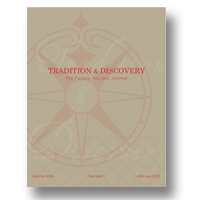|
journal and society information |
|
1.
|
Tradition and Discovery: The Polanyi Society Periodical:
Volume >
45 >
Issue: 2
Editorial Board and Submissions Guide
view |
rights & permissions
| cited by
|
|
|
|
|
|
|
2.
|
Tradition and Discovery: The Polanyi Society Periodical:
Volume >
45 >
Issue: 2
Collin Barnes
A Word from the Guest Editor
view |
rights & permissions
| cited by
|
|
|
|
|
|
|
3.
|
Tradition and Discovery: The Polanyi Society Periodical:
Volume >
45 >
Issue: 2
Paul Lewis
Preface
view |
rights & permissions
| cited by
|
|
|
|
|
journal and society information |
|
4.
|
Tradition and Discovery: The Polanyi Society Periodical:
Volume >
45 >
Issue: 2
Notes on Contributors
view |
rights & permissions
| cited by
|
|
|
|
|
focus on a new positivism |
|
5.
|
Tradition and Discovery: The Polanyi Society Periodical:
Volume >
45 >
Issue: 2
Martin X. Moleski, S.J.
A Polanyian Appraisal of Outcomes Assessment:
Defending the Art of Knowing against Positivist Pedagogy
abstract |
view |
rights & permissions
| cited by
While it is sensible to measure that which can be measured, outcomes assessment is completely out of step with Polanyi’s understanding of personal knowledge. Current assessment practices represent the revival of positivism in higher education. They ignore the tacit dimension of all knowledge, hinder the development of connoisseurship, and reinforce the power of the administrative class.
|
|
|
|
|
6.
|
Tradition and Discovery: The Polanyi Society Periodical:
Volume >
45 >
Issue: 2
Timothy L. Simpson
Polanyian Insights on “Professional” Teacher Education
abstract |
view |
rights & permissions
| cited by
To demonstrate the power and scope of Polanyi’s thought, this paper will establish the importance of Polanyi’s abundant insight for the accreditation of educator preparation programs in higher education. This inquiry will begin with a brief summary of the role and purpose of accreditation of educator preparation programs, highlighting the positivist presuppositions driving the current assessment process. With the aid of Harry Broudy, a close student of Polanyi, the essay will identify the implications of those presuppositions for educator preparation programs. Broudy’s analysis suggests that, despite claims to the contrary, the current assessment process fails to produce a professional teacher. In contrast, inspired by a rejuvenated perspective informed by Polanyi’s monumental elucidation of the tacit dimension, assessment of educator preparation programs may instead cultivate a truly professional teacher for our schools. The closing section of this study will provide an outline of such a renaissance.
|
|
|
|
|
7.
|
Tradition and Discovery: The Polanyi Society Periodical:
Volume >
45 >
Issue: 2
Nigel Newton
A Polanyian Perspective on the Place of Knowledge Within the Curriculum
abstract |
view |
rights & permissions
| cited by
A new national school curriculum in Wales that parallels reforms in other countries and regions is in the process of being implemented. Several issues debated in the context of these reforms relate to the effectiveness of a school’s curriculum to help young people develop skills and dispositions believed to be necessary for participation in the modern economy. Others are concerned about the loss of core subject related knowledge linked to academic disciplines. Wrestling with these questions motivated me to consider how Polanyi’s thought could point the way to addressing these issues, particularly his concept of commitment and argument for a hierarchically structured view of reality. In this paper I explore these issues by drawing from the sociologist Michael F.D. Young’s work on ‘powerful knowledge’ as a way to frame my consideration of the curriculum debates from a Polanyian perspective. Young argues that providing access to knowledge should be seen as the primary goal of school curriculums and argues that the best route to achieving this is through academic subjects. The paper will show how this argument is strengthened by consideration of insights from Polanyi.
|
|
|
|
|
8.
|
Tradition and Discovery: The Polanyi Society Periodical:
Volume >
45 >
Issue: 2
Collin D. Barnes
A Polanyian Response to “Psychology’s Renaissance”
abstract |
view |
rights & permissions
| cited by
A recent article in the Annual Review of Psychology heralds the arrival of a renaissance in psychology that is improving research practices in the field. The present article evaluates this new epoch in light of Michael Polanyi’s thought. While the reforms the renaissance celebrates are invaluable to psychology in its reliance on probabilities for hypothesis testing, they under appreciate the central place of personal judgments in research, portraying them instead and primarily as sources of error that must be curtailed by a narrow range of methods. Valuing the place of personal participation in probability judgments may embolden psychologists to accredit inquiries that more openly rely on discernment to declare truth and are better suited to the I-Thou relations that distinguish human psychology from the study of matter in motion.
|
|
|
|
|
book reviews |
|
9.
|
Tradition and Discovery: The Polanyi Society Periodical:
Volume >
45 >
Issue: 2
Janos Liska
Tacit Emergence: Beyond Interaction
view |
rights & permissions
| cited by
|
|
|
|
|
10.
|
Tradition and Discovery: The Polanyi Society Periodical:
Volume >
45 >
Issue: 2
Spencer Case
Dark Matter of the Mind: the Culturally Articulated Unconscious
view |
rights & permissions
| cited by
|
|
|
|





